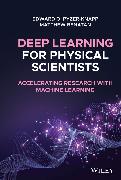- Start
- Deep Learning for Physical Scientists
Deep Learning for Physical Scientists
Angebote / Angebote:
This book introduces the reader to the transformative techniques involved in deep learning. A range of methodologies are addressed including: * Basic classification and regression with perceptrons * Training algorithms, such as back propagation and stochastic gradient descent and the parallelization of training * Multi-Layer Perceptrons for learning from descriptors, and de-noising data * Recurrent neural networks for learning from sequences * Convolutional neural networks for learning from images * Bayesian optimization for tuning deep learning architectures Each of these areas has direct application to physical science research, and by the end of the book, the reader should feel comfortable enough to select the methodology which is best for their situation, and be able to implement and interpret outcome of the deep learning model. The book is designed to teach researchers to think in new ways, providing them with new avenues to attack problems, and avoid roadblocks within their research. This is achieved through the inclusion of case-study like problems at the end of each chapter, which will give the reader a chance to practice what they have just learnt in a close-to-real-world setting, with example 'solutions' provided through an online resource. This book introduces the reader to the transformative techniques involved in deep learning. A range of methodologies are addressed including: *Basic classification and regression with perceptrons *Training algorithms, such as back propagation and stochastic gradient descent and the parallelization of training *Multi-Layer Perceptrons for learning from descriptors, and de-noising data *Recurrent neural networks for learning from sequences *Convolutional neural networks for learning from images *Bayesian optimization for tuning deep learning architectures Each of these areas has direct application to physical science research, and by the end of the book, the reader should feel comfortable enough to select the methodology which is best for their situation, and be able to implement and interpret outcome of the deep learning model. The book is designed to teach researchers to think in new ways, providing them with new avenues to attack problems, and avoid roadblocks within their research. This is achieved through the inclusion of case-study like problems at the end of each chapter, which will give the reader a chance to practice what they have just learnt in a close-to-real-world setting, with example 'solutions' provided through an online resource. Market Description This book introduces the reader to the transformative techniques involved in deep learning. A range of methodologies are addressed including: * Basic classification and regression with perceptrons * Training algorithms, such as back propagation and stochastic gradient descent and the parallelization of training * Multi-Layer Perceptrons for learning from descriptors, and de-noising data * Recurrent neural networks for learning from sequences * Convolutional neural networks for learning from images * Bayesian optimization for tuning deep learning architectures Each of these areas has direct application to physical science research, and by the end of the book, the reader should feel comfortable enough to select the methodology which is best for their situation, and be able to implement and interpret outcome of the deep learning model. The book is designed to teach researchers to think in new ways, providing them with new avenues to attack problems, and avoid roadblocks within their research. This is achieved through the inclusion of case-study like problems at the end of each chapter, which will give the reader a chance to practice what they have just learnt in a close-to-real-world setting, with example 'solutions' provided through an online resource.
Lieferbar in ca. 10-20 Arbeitstagen
